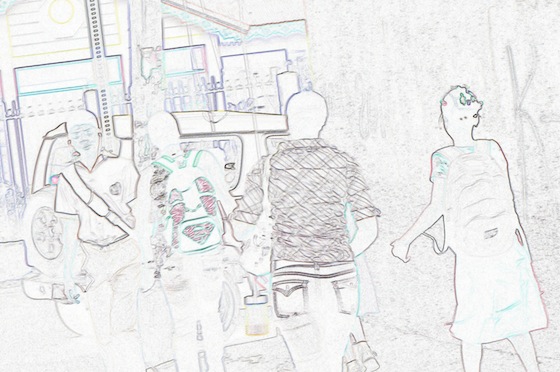How Science, Math and Creole Education Can Lead to Prosperity in Haiti
By Ilio Durandis
CJ Contributor
THE STRUGGLE to reform the educational system in Haiti is nothing new; everything from using Creole to incorporating a practical approach to science, technology, math and the arts in every classroom have been a dream for so long, but, more recently, a glimpse of a new reality has surfaced.
Students in Haiti generally get their education in French, a language that most do not ordinarily speak at home, but are obligated to use for their studies.
Efforts were made in the past — more precisely in the late 1960s and early 1970s, when the Center of Investigation of Haitian Social Studies (CHISS) received foreign grants to perform experiments by using Creole as an initial learning language for education. Although the results were encouraging, the follow-up and necessary implementations never took place.
In more recent times, there have been two major educational reforms in Haiti, at least on paper, which Luzincourt and Gulbrandson (2010) cited: The Bernard reform of 1978, which resulted in the recognition of Creole in classrooms, and the National Plan of Education and Training of 1997, which was an attempt to shift from the French educational model to a more participatory student-centered approach.
There are many reasons for the failure of both reforms — among them a lack of funds, and an execution plan. Professor Marc Prou (2009), in particular, said that the lack of support from major players led to the failure of the Bernard reform from the start.
In any case, we are now living in a world that moves at an exponential rate when it comes to digital technology. Many things that used to take years, now with the right people in place could be reduced to a few days. What was once impossible is now very possible, and a good example is distance learning through the various open courses from major American universities.
In order for Haiti to catch up with the industrialized and developing world, it must transform its educational system and ask a few important questions: What should Haitian students study? How should they be educated? Who should be doing the teaching? And what is expected of an educated Haitian?
There is a large body of literature that points to the value of the STEM education and how that can lead to development and democracy (Holt et.al 2011, D’Ambrosio 2001.)
Just last month, a visit by Haiti’s current Prime Minister, Laurent Lamothe, at the Massachusetts Institute of Technology (MIT) garnered great headlines in the media. Prime Minister Lamothe in the name of the Haitian government signed an MOU with MIT that will facilitate the use of modern technology to teach complex subjects, such as science and math in Creole in some of Haiti’s post-secondary establishments.
At MIT, professor Michel DeGraff is doing all he can to promote the use of Creole via technology in Haiti’s school system. Not too long ago, he received an NSF grant that would allow him to achieve this goal — and, just a few months ago, he brought a team to Haiti to train Haitian college professors on how to use some of the educational tools being developed at MIT.
The MOU between MIT and the Haitian government can be a giant step at transforming education in Haiti, but it has to be more than just a headline. There must be substance, a clear path forward, and a dialogue among all the concerned actors, in order to make this dream a reality for Haiti.
Haiti’s government must lead this transformation. It is encouraging that the current administration has found a way to fund primary education for all, but for the sake of continuity and true success, transparency and accountability must play an important role in this plan.
The Haitian society needs to settle on the type of education they want for this and future generations. Can Creole be the main language used for complex subjects such as math and science?
Studies have proven that students learn best in the language that they speak and understand best. The language in which information is disseminated is very important, not only for learning, but also for creativity and innovation.
It is time that a greater purpose be linked with education in Haiti; a purpose that can play a role in transforming the society from consumerism to include a producer-based and innovative culture. It’s time for education that will lead to employment.
The sciences and math can play a pivotal role toward that end. It should not be acceptable for students to receive the equivalent of a high school diploma, and never actively participate in a laboratory experiment. How should it be considered learning, if students are forced to memorize math problems for state exams? The culture of education needs to change.
The educational transformation that needs to take place in Haiti must give the STEM subjects their rightful place in the curriculum. A culture of critical thinking must replace memorization, and full learning immersion in the native language, Creole, can only boost the creativity of Haitian students.
In order to accomplish this dream of making Haiti an emerging country within the next decade, STEM education, along with added emphasis in arts and languages, must play a pivotal role in the classroom.
Haitian students must learn to become creators, inventors, entrepreneurs, and noble citizens.
This would require a holistic review of the educational system. Teachers would need to be better trained, schools would need to be inspected and be obligated to meet minimum requirements. Lastly, funds would have to be made available for students, not only at the primary school level, but throughout the formative years all the way to post-secondary education.
As the news headlines fade, Haitian educators, current students, and parents must not get satisfied with a few good words, but they must consistently demand transformation of the educational system. This is the surest way to develop Haiti, and create a sustainable economic prosperity that can benefit everyone in Haiti.
Ilio Durandis, a Caribbean Journal contributor, is the founder of Haiti 2015, a social movement for a just and prosperous Haiti. He is also a columnist with The Haitian Times.
Ketty Luzincourt and Jennifer Gulbrandson. 2010. “Education and Conflict in Haiti.” United States Institute of Peace
Lynn Holt, David Colburn and Lynn Leverty, 2011. “Innovation and STEM Education.” Bureau of Economic and Business Research
Marc Prou, 2009.”Attempts at Reforming Hait’s Education System: The Challenges of Mending the Tapestry 1979-2004.” The Journal of Haitian Studies, Volume 15 No 1&2
Ubiratan D’Ambrosio, 2001 . “The Role of Mathematics in building a democratic society.” Mathematical Association of America







